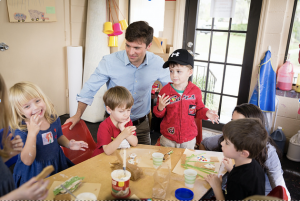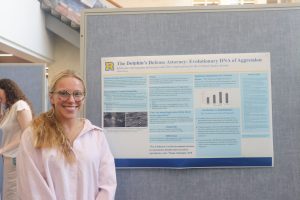
“It was a big and sort of weird time for Christianity. They had culture, and they had the classics; they just weren’t really sure…where to go from there. Augustine comes along trying to explain this whole Trinity business in a similar manner to Plato, and says ‘well, if God exists in three states, maybe my mind and soul exists in three states as well, and maybe this is the same way it is for God, but maybe not.’ Sort of funny that the Church made him an authority later on.”
Every student who has taken a class with Dr. Erik Kenyon of Rollins’ Philosophy Department will recognize the casual, concise, and humorous tone with which he answers my question of what St. Augustine’s main ideas and thoughts are. Erik tends to introduce topics, deliberately or otherwise, by highlighting the silliness or bizarreness involved before delving into deeper reflection.
I remember his initial overview of Plato’s Apology from the ICE class Socrates and the Art of Living: “The dialogue is basically Socrates’ prosecutors accusing him of corrupting the youth because ‘being obnoxious’ isn’t a legal offense, and Socrates giving a snarky response as his defense.”
Erik received his B.A. magna cum laude from the University of Vermont in Philosophy, Greek and Music in 2002, his M.A. from the same university two years later in Greek and Latin, and his PhD from Cornell in 2012, specializing in ancient dialogue and Augustine.
His published works include Augustine and the Dialogue, “Early Medieval Ethics” in the Cambridge Companion to Medieval Ethics, and “Augustine and the Liberal Arts,” in Arts and Humanities in Higher Education. Currently, he is co-authoring with Diane Terorde-Doyle “The Three R’s of Thinking: Nurturing Discussion in Preschools.” The methods detailed in the article have been refined through lesson-planning and testing with the kids at Rollins’ own Child Development Center, led by Dr. Kenyon and the CDC’s Director, developmental psychologist, and professor, Dr. Sharon Carnahan. I have had the bizarre and stressful pleasure of leading these lessons for the kids, along with nine other undergraduate students.
“4 year-olds are just amazing,” Erik says to me. “They deal with a crazy amount of challenges on a daily basis: getting along with other people while lacking many social skills, interacting with a world they largely don’t understand, lacking words to express themselves…this kind of stress would break most adults.”
It is not very difficult to then see why he chose to pioneer Philosophy 4 Kids.
He continues:
“P4K is a fusion of two skill sets: interacting with children and framing philosophical discussions. Doing philosophy with people like this is, in one sense, challenging, since it requires us adults to boil down philosophical methods and ideas to their absolutely most central forms. At the same time, it’s easy, since if we do our job right, the kiddos totally take to it. You can see it in how they come to think. On the playground, they are saying things like “you need to use more self-control” and getting into discussion over who owns the ocean.”
With the help of Doyle and the CDC’s teachers and Dr. Carnahan grounding it in contemporary cognitive science, Erik’s current project involves co-authoring a book-length Pre-K Ethics Curriculum.
I had to know what philosophy is to Erik, and when asked, he replied:
“Bertrand Russell once said, ‘Science is what you know, and Philosophy is what you don’t know.’ I like the idea of Philosophy as a disciplined way of thinking about stuff that matters that we don’t have a clear handle on yet. . . People today, maybe not scientists but people who put faith in science, tend not to appreciate how messy, complicated and ambiguous the world actually is… The same kind of thing draws me to ancient ethics, which is all about how to live well. Everyone you’ll ever meet has a life, will want to live well and –if pressed the right way– will have a hard time saying exactly what that “living well” means. If you can get them to take the bait, boom: you’re doing philosophy.”
Rollins has made an impact on Erik, so much so that he describes his first experience teaching here as a life-defining moment, albeit a bizarre one.
Currently the Director of Student and Faculty Engagement in the Rollins Holt Program, and teaching a 300-level ICE class next semester, it’s safe to say that Dr. Erik Kenyon isn’t leaving us just yet.











Be First to Comment